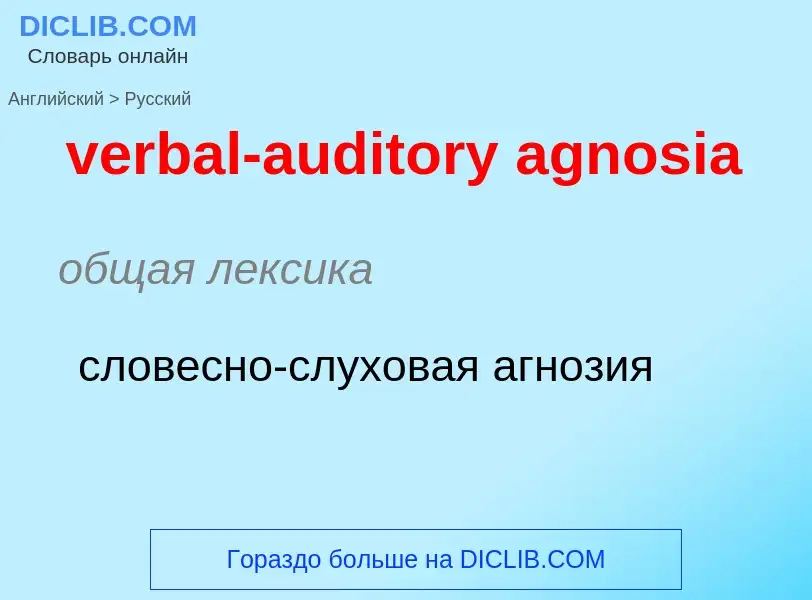Traducción y análisis de palabras por inteligencia artificial ChatGPT
En esta página puede obtener un análisis detallado de una palabra o frase, producido utilizando la mejor tecnología de inteligencia artificial hasta la fecha:
- cómo se usa la palabra
- frecuencia de uso
- se utiliza con más frecuencia en el habla oral o escrita
- opciones de traducción
- ejemplos de uso (varias frases con traducción)
- etimología
verbal-auditory agnosia - traducción al ruso
общая лексика
словесно-слуховая агнозия
[æg'nɔʒ(i)ə]
общая лексика
агнозия
медицина
агнозия (нарушение процесса узнавания предметов и явлений)
Смотрите также
существительное
медицина
агнозия
нарушение процессов узнавания (предметов, звуков и т. п.)
медицина
психическая слепота
Definición
Wikipedia
An auditory hallucination, or paracusia, is a form of hallucination that involves perceiving sounds without auditory stimulus. While experiencing an auditory hallucination, the affected person would hear a sound or sounds which did not come from the natural environment.
A common form of auditory hallucination involves hearing one or more voices without a speaker present, known as an auditory verbal hallucination. This may be associated with psychotic disorders, most notably schizophrenia, and this phenomenon is often used to diagnose these conditions. However, individuals without any psychiatric disease whatsoever may hear voices, including those under the influence of mind-altering substances, such as cannabis, cocaine, amphetamines, and PCP.
There are three main categories into which the hearing of talking voices often fall: a person hearing a voice speak one's thoughts, a person hearing one or more voices arguing, or a person hearing a voice narrating their own actions. These three categories do not account for all types of auditory hallucinations.
Hallucinations of music also occur. In these, people more often hear snippets of songs that they know, or the music they hear may be original. They may occur in mentally sound people and with no known cause. Other types of auditory hallucinations include exploding head syndrome and musical ear syndrome. In the latter, people will hear music playing in their mind, usually songs they are familiar with. These hallucinations can be caused by: lesions on the brain stem (often resulting from a stroke), sleep disorders such as narcolepsy, tumors, encephalitis, or abscesses. This should be distinguished from the commonly experienced phenomenon of getting a song stuck in one's head. Reports have also mentioned that it is also possible to get musical hallucinations from listening to music for long periods of time. Other causes include hearing loss and epileptic activity.
In the past, the cause of auditory hallucinations was attributed to cognitive suppression by way of executive function failure of the frontoparietal sulcus. Newer research has found that they coincide with the left superior temporal gyrus, suggesting that they are better attributed to speech misrepresentations. It is assumed through research that the neural pathways involved in normal speech perception and production, which are lateralized to the left temporal lobe, also underlie auditory hallucinations. Auditory hallucinations correspond with spontaneous neural activity of the left temporal lobe, and the subsequent primary auditory cortex. The perception of auditory hallucinations corresponds to the experience of actual external hearing, despite the absence of any sound itself.


